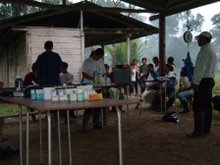It’s my third year of surgery residency. I enter Starbucks in a flurry, a carefully timed practice designed to enter the store just after it opens and to exit just in time to be at work 3 minutes early. I grab the coffee, letting the piping hot liquid splash onto my hand a little as I use the other hand to snatch two sugars. As I tear open the packets and pour, the other hand reaches for a stirrer. Stirring with one hand, the other grabs the sippy top and I am back in my car 4 minutes later, racing down Broad to the hospital. One-handed, of course.
Surgeons are naturally impatient people, and the business demands of health care only encourage a sense of urgency. Amidst the piles of dictations and paperwork every doctor battles, surgeons must also spend a great deal of life in a sterile bubble where multi-tasking is impossible. Being efficient becomes even more vital, and benign tasks become unnecessarily stressful. The sense of urgency transfers to everyone and everything involved, both inside and outside the hospital.
Efficiency is key. No matter how efficient you are, you can always be more efficient. My mentors often remind me in the operating room that I have two hands, and they should both be doing something useful at any given point in the case. This dogma is not limited to the operating room, hence the coffee routine.
On morning rounds, for instance, seeing fifteen surgical patients and dressing their wounds in an hour is a perfectly calculated science. A quick squirt of hand sanitizer is followed by flipping the lights on, apologizing for the light, and making a beeline for the surgical wound/abdomen. One hand opens the gauze while the other rips off the patient’s previous dressing. Fresh gauze replaces the soiled one as the other hand reaches for tape. Pulling tape is, alas, a two-hand job, so for the moment both hands reluctantly work in tandem. This frenzied orchestra occurs amidst a rushed conversation with the patient during which time an attempt is made to display true concern for his/her well-being under five minutes while trying to extract three distinct pieces of information: 1) whether diet is tolerated, 2) whether gas or poop has exited the rectum and 3) whether pain is controlled. This process is repeated over the course of 60 minutes. Hand sanitizer, lights on, gloves, feel belly, change dressing, extract information, lights off, gloves off, hand sanitizer. Next.
Efficiency is not limited to the hospital. Coming home is also a premeditated sequence. My parking lot, located three short blocks from my apartment building, is a daily waste of time. I usually jog the distance--not because I need the exercise, but because it is faster than walking. Meanwhile, I survey the streets hoping no one I know is witnessing my exhausted lunatic shuffle. Once in the elevator, I shake off my white coat, poised to exit and walk down the hallway to my apartment (I have the decency to walk when others are in such close proximity). Entering the door is followed swiftly by hurling my bag, jacket and shoes to their designated corner. Conversations with my husband generally occur from a distance, because I can only prepare something to eat, wash up, or check emails if I’m not spending time with a face-to-face interaction. Sitting on the couch with him is similarly avoided as it carries the hazard of hearing about his day or sharing the details of mine, both of which are low-yield as the events have already been digested independently.
The day is filled with similar repetitive motions that are boiled down to a number of steps directed toward accomplishing mundane tasks. There is nothing mundane about surgery, but despite the excitement and variability of each patient, the algorithm remains the same. I am forever trying to get ahead of myself, trying to check the next thing off on the to-do list, striving to save up a pocket of time to breathe. Yet when the pocket of time arrives, I'm still jogging. The ridiculousness of this approach lies in its lack of humanity. When did I forget that the whole point of being a doctor was to get to know people’s suffering, to really get to know it, to reach into the bowels of it (no pun intended) with the intent to remove it forever? As idealistic as that dream was, there was some dignity to it, and what do we have to stand on if not the dignity of bright-eyed idealism?
Everyone in medical school urged me not to go into surgery because it would change me. I told them (and still do) that was impossible. During my first year of surgery residency, when colleagues found me nice, again they pleaded with me not to change. Two years later, I am still the same person (just last week, a medical student observing our veritable zoo of personalities urged me to "never change."). But in so many ways I have succumbed to what I was so fervently warned me about and what I myself so intently dislike. When did I forget that walking a few blocks was the perfect amount of time to stop and breathe fresh air? When did people become less important to me than tasks? Weren’t the tasks in place to serve the people? I love my patients. I love their faces, their personalities, their suffering, their disease process and their healing process. I can’t wait to one day have patients of my own, who I see in my office and hold hands with through the hardship of surgical disease. A cloying sentiment, surely, and certainly not an efficient one. So maybe there’s hope for me yet.
Subscribe to:
Post Comments (Atom)





No comments:
Post a Comment